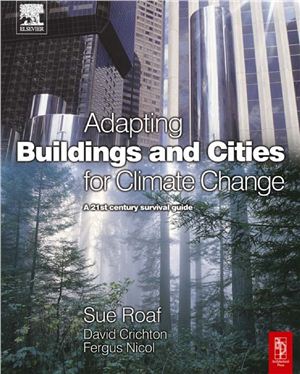Sue Roaf PhD (Author), David Crichton (Author), Fergus Nicol
(Author) Adapting Buildings and Cities for Climate Change: A 21st
Century Survival Guide, - Architectural Press (January 13, 2005),
384 pages
'A timely and fascinating book on the crucial issue of energy use in buildings which accounts for half of our total energy use.'
Stephen Tindale, Executive Director, Greenpeace, UK
'We are at the crossroads of the most significant crisis of mode times. Two profound, life changing events are converging to create this crisis - the warming of the earth's atmosphere by buing fossil fuels, and the rapid depletion of global petroleum and natural gas reserves. As these events intensify over the coming years, they will dramatically change how we live and how we relate to the natural world. These changes can cause the human race great pain and suffering or they can inspire a historic transition to a kinder and gentler world.
Sue Roaf, David Crichton and Fergus Nicol in their new book Adapting Buildings and Cities for Climate Change, dissect these events and rightly conclude that at the center of this crisis stands the architecture and building community. They clearly illustrate that this community, unknowingly, is chiefly responsible for precipitating this crisis and argue for nothing less than a building design revolution to address the problem.
What makes this book so important is that it not only outlines the issues and science behind climate change, but details the steps necessary to alleviate future large scale dislocations and hardship. Ms. Roaf identifies the key players in this struggle, their roles, and the actions needed to spark this revolution. She makes it crystal clear that there is no technological fix looming on the horizon, and that if the architecture and building community do not step forward and lead, there is little hope for meaningful change to take place. This book contains the framework for beginning the critical dialogue necessary to confront humanity's greatest challenge.'
SBSE joual
Provides an insight into the real changes that are necessary to give our mode day built environment both 'sustainability' and 'survivability'
'A timely and fascinating book on the crucial issue of energy use in buildings which accounts for half of our total energy use.'
Stephen Tindale, Executive Director, Greenpeace, UK
'We are at the crossroads of the most significant crisis of mode times. Two profound, life changing events are converging to create this crisis - the warming of the earth's atmosphere by buing fossil fuels, and the rapid depletion of global petroleum and natural gas reserves. As these events intensify over the coming years, they will dramatically change how we live and how we relate to the natural world. These changes can cause the human race great pain and suffering or they can inspire a historic transition to a kinder and gentler world.
Sue Roaf, David Crichton and Fergus Nicol in their new book Adapting Buildings and Cities for Climate Change, dissect these events and rightly conclude that at the center of this crisis stands the architecture and building community. They clearly illustrate that this community, unknowingly, is chiefly responsible for precipitating this crisis and argue for nothing less than a building design revolution to address the problem.
What makes this book so important is that it not only outlines the issues and science behind climate change, but details the steps necessary to alleviate future large scale dislocations and hardship. Ms. Roaf identifies the key players in this struggle, their roles, and the actions needed to spark this revolution. She makes it crystal clear that there is no technological fix looming on the horizon, and that if the architecture and building community do not step forward and lead, there is little hope for meaningful change to take place. This book contains the framework for beginning the critical dialogue necessary to confront humanity's greatest challenge.'
SBSE joual
Provides an insight into the real changes that are necessary to give our mode day built environment both 'sustainability' and 'survivability'

